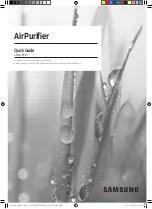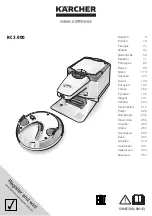
MAINTAINING THE PHOTO~CATALYTIC PURE AIR PURIFIER
What The Service Panel Indicator Lights Mean
Indicator lights on the Service Panel tell you if either the ultraviolet lamp, or the air
filters, will soon need to be replaced, or if they must be replaced before using the
Purifier again.
UV Lamp Indicator Lights
The Ultraviolet lamp has a useful life of one year (approximately 9,000 active
hours) with a one month grace period.
Green light is On - the lamp has been in service for less than 12 months.
Yellow SERVICE SOON light is On - the lamp has been in service for more than
12 months. It’s time to order a new lamp.
Red SERVICE NOW light is On - the lamp has been in service for more than 13
months. The lamp may not be effective and must be replaced.
Filter Indicator Lights
The filters have a useful life of one year in a typical
residential environment. The filter service life span can
vary greatly depending upon the individual location and
application where the unit is placed.
It is recommended that when the FILTER service light
turns red and the LAMP light is green, the front grill
should be removed and the top pre-filter ONLY can be
cleaned with a vacuum hose attachment to remove the
collected dirt and debris. NOTE: Be careful not to scrap
or puncture the filter media when cleaning.
It is recommended that BOTH the UV lamp and filter
set be replaced at the end of 12 month operation when both service indicator
lights turn red. This will assure maximum air flow and air quality.
The FILTER lights on the Service Panel designate the following:
• FILTER Green “OK” light is On – The filters have been in service for less than
5 months from reset date
• FILTER Yellow “SERVICE SOON” light is On – The filters have been in service
for less than 6 months
• FILTER and LAMP Yellow “SERVICE SOON” light is On – The filters have
been in service for less than 12 months. It is time to order a new filter package.
• FILTER Red “SERVICE NOW” light is On – The filters have been in service for
6 months and only the top Green filter should be cleaned.
• FILTER and LAMP “SERVICE NOW” Red light is On – The filters have been in
service for 12 months and should be changed with the lamp.
air pollution. For example: high winds which increase airborne dust and pol-
len. Heavy room loading, such as parties and heavy smoking. Super-Mode
operation will increase blower speed approximately 25 percent above auto
mode setting.
ECONOMY MODE - This mode saves energy cost during hours when the
room is unoccupied. When people are moving in the room, operation is the
same as that in the Auto Mode. When no motion has been detected in the
room for 30 seconds, blower speed is reduced by 35 percent to save electric-
ity costs. The blower returns to normal speed when motion is again detected
in the room.
SLEEP MODE - This mode reduces the sound level by reducing blower speed
by 30 percent, while still purifying room air at 70 percent of normal while the
occupant sleeps.
Monitoring Operation
You can always monitor the quality of room air, and make sure that the
Purifier is set to move a volume of air appropriate for present condi-
tions. Note that measurements are relative to the selected room size.
Make sure that the “Room Size” panel is always set for the room in
which the unit operates. “Quality” and “Volume” are shown on the In-
formation display.
Air quality is sensed by the chemical-detection sensor (see figure 1)
which continually evaluates air quality. Air quality is expressed by one of
five lights expressing a range from GOOD to POOR.
Air volume is shown by one of seven lights
(figure 4) representing a range from greater than
normal air flow, to reduced air flow (energy-sav-
ing Sleep Economy Mode). The light shows that
air volume is just right for the selected room size.
You should also keep an eye on the Service Panel
which tells you if maintenance will soon be
required, or if maintenance is required for fur-
ther operation. The Service Panel is described in
Maintaining the Pure Air Purifier.
SERVICE
NOW
SERVICE
SOON
ON
RESET
LAMP
FILTER
SERVICE
Figure 5
MAX
MIN
POOR
GOOD
QUALITY VOLUME
INFORMATION
Figure 4
-page 6-
-page 5-
























